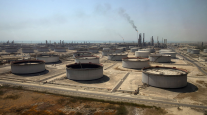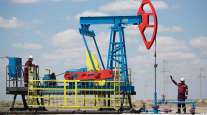OPEC+ Meets to Discuss Output Hike, With Saudis Urging Caution

[Ensure you have all the info you need in these unprecedented times. Subscribe now.]
Saudi Arabia urged caution as OPEC+ gathered to discuss whether to hike supply again in February, with many countries wary of undermining a fragile recovery.
The kingdom highlighted the new risk to the oil market posed by a more infectious strain of the coronavirus, which has heightened the economic risks even as the rollout of vaccines has buoyed prices.
“At the risk of being seen as a killjoy in the proceedings, I want to urge caution,” Saudi Energy Minister Prince Abdulaziz bin Salman said at the start of the group’s video conference on Jan. 4. “The new variant of the virus is a worrying and unpredictable development.”
Russia, the cartel’s de facto leader alongside Saudi Arabia, publicly backed an additional boost in late December. At the opening session of the Jan. 4 meeting, Deputy Prime Minister Alexander Novak gave no clear signal about whether he is holding to that position. He highlighted the “healthier shape” of the market and the progress in vaccinations, but also warned of “uncertainties ahead.”

The Organization of Petroleum Exporting Countries and its allies must decide whether to add more barrels to the market. They are currently idling 7.2 million barrels a day, or about 7% of world supplies, and plan to return a further 1.5 million barrels a day in installments no larger than 500,000 barrels a day over the coming months.
The group is already taking a cautious approach, agreeing in December to meet every month — rather than just a few times a year — in order to fine-tune production levels more precisely and avoid capsizing the price recovery they spent most of 2020 working to achieve.
Talks between a panel of ministers that oversees the OPEC+ deal earlier on Jan. 4 concluded without a policy recommendation, leaving the decision to the full meeting of the entire group.
Other prominent voices from the alliance echoed Prince Abdulaziz’s caution. “There’s a need to be wary of the repercussions of the second wave of the pandemic,” state-run Kuwait News Agency reported Jan. 4, citing a statement from Oil Minister Mohammed Alfares.
OPEC Secretary-General Mohammad Barkindo said at a Jan. 3 preparatory meeting that “there are still many downside risks to juggle.”
The case for another small OPEC+ output increase in February is underpinned by a recovery in the oil prices, which have gained more than a third since the emergence of the first COVID vaccines last year.
The immunizations have created a “healthier” outlook for oil consumption, which will soon “shift from reverse to forward gear,” Barkindo said at the Joint Technical Committee meeting on Jan. 3. The panel assesses implementation on behalf of the 23-nation alliance.
Russia’s Novak signaled last month that he was ready to proceed, saying that prices are in an optimal range of $45 to $55 a barrel. If OPEC+ refrains from bolstering exports, its competitors will simply fill the gap, he said.
Javier Blas, Grant Smith and Salma El Wardany were the primary contributors to this report.
Want more news? Listen to today's daily briefing:
Subscribe: Apple Podcasts | Spotify | Amazon Alexa | Google Assistant | More




